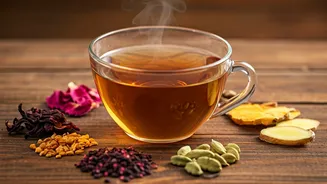Tea's Heart-Healthy Perks
Herbal teas, often embraced for their comforting qualities, are also recognized for their potential to foster heart health. These beverages, distinct from
traditional teas that come from the Camellia sinensis plant, are derived from various herbs, fruits, and flowers. They are naturally caffeine-free. The unique composition of each herbal tea provides an array of health advantages, including anti-inflammatory and antioxidant effects, both crucial for maintaining a healthy cardiovascular system. In India, where lifestyle and dietary choices heavily influence heart health, incorporating herbal teas can be a simple, yet impactful step towards well-being. They offer a flavorful and accessible means of enhancing heart health alongside a balanced lifestyle and regular exercise, making them an excellent choice for health-conscious individuals.
Hawthorn Berry Tea
Hawthorn berry tea is frequently championed for its effectiveness in promoting cardiovascular health. Its primary benefits stem from its capacity to dilate blood vessels, subsequently enhancing blood circulation and easing the strain on the heart. The presence of flavonoids in hawthorn berries contributes to their antioxidant properties, which safeguard cells from damage and lessen inflammation, a significant risk factor for heart disease. Furthermore, hawthorn tea is believed to possess the ability to regulate blood pressure and potentially diminish cholesterol levels. For Indians, hawthorn berry tea is an advantageous option, providing both therapeutic advantages and a refreshing taste. Consistent consumption of this tea, paired with a balanced diet, can contribute significantly to the overall well-being of the cardiovascular system. It is important to note that, as with any herbal remedy, consulting with a healthcare expert before incorporating hawthorn berry tea into your regimen is a wise practice, particularly for individuals on medication.
Hibiscus Tea's Benefits
Hibiscus tea, known for its vibrant red color and tangy flavor, presents a potent ally in promoting heart health. Numerous studies suggest that regular intake of hibiscus tea can significantly lower both systolic and diastolic blood pressure, making it a valuable beverage for those at risk of hypertension. The antioxidants present in hibiscus, like anthocyanins, are pivotal in combating oxidative stress and minimizing the likelihood of developing heart disease. Beyond its potential to lower blood pressure, hibiscus tea may also help in lowering cholesterol levels, thus enhancing overall cardiovascular health. In India, hibiscus is easily accessible and culturally relevant, making hibiscus tea an effortless addition to the daily diet. Its refreshing taste, coupled with its health advantages, makes it a favored choice among those aiming to improve their heart health naturally. The incorporation of hibiscus tea into your regimen should be balanced with other healthy practices, such as consistent exercise and a heart-conscious diet.
Green Tea's Advantages
Green tea, a beloved beverage around the globe, also confers substantial benefits on heart health. The high concentration of catechins, a type of antioxidant, found in green tea helps in mitigating inflammation and defending cells against harm from free radicals. These actions contribute to the decreased risk of developing heart disease. Green tea has been linked to better cholesterol levels, especially in lowering LDL (bad) cholesterol and boosting HDL (good) cholesterol, which is essential for cardiovascular well-being. In India, where green tea is widely available and integrated into daily routines, it is a convenient and enjoyable method to support heart health. Consistent intake, along with a balanced diet and regular exercise, may significantly improve cardiovascular health. However, because green tea does contain caffeine, people sensitive to caffeine should be aware of their consumption and its potential effects. Consulting with a healthcare expert before making considerable dietary changes is always advisable.
Ginger Tea's Role
Ginger tea, renowned for its zesty flavor and soothing properties, presents notable benefits for heart health. The primary advantage of ginger is its potent anti-inflammatory effects. By decreasing inflammation in the body, ginger lessens the strain on the cardiovascular system and lowers the risk of heart disease. Furthermore, ginger can improve blood circulation and contribute to blood pressure regulation. These benefits are particularly significant for people in India, where lifestyle choices can impact heart health. Ginger tea is also easily accessible and often included in traditional home remedies across various Indian regions. Including ginger tea in your daily diet is an uncomplicated and enjoyable means of supporting heart health. Combining it with other heart-healthy habits such as a balanced diet and physical activity may augment its benefits. As with any herbal tea, it is recommended that you check with a doctor before including ginger tea in your regimen, particularly if you have underlying health issues or are currently taking medication.
Rooibos Tea Benefits
Rooibos tea, a herbal infusion originating from South Africa, has gained recognition for its potential to support heart health. This tea is naturally caffeine-free and rich in antioxidants, notably aspalathin, which is believed to safeguard the heart from damage. Rooibos tea is thought to have the ability to lower blood pressure and improve overall cardiovascular function. This tea is particularly helpful in managing blood pressure and maintaining a healthy heart in India, where cardiovascular diseases are a significant health concern. Rooibos tea is easily available in most health stores and online platforms. Regular consumption of Rooibos tea as a part of a balanced diet and active lifestyle can aid in preserving heart health and boost overall well-being. It is advisable to consult a healthcare expert before including Rooibos tea into your daily routine, especially if you have an underlying health condition.























